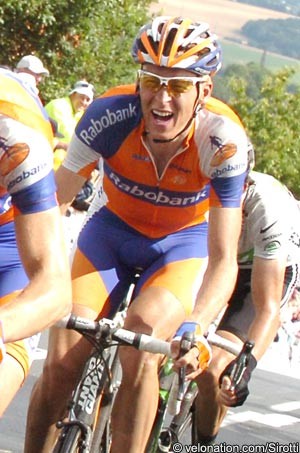Rabobank look to modified strategy for remainder of race, Mollema gunning to recover some time
 Ever since he finished seventh in the Vuelta a España at 22 years of age, Robert Gesink has been seen as a rider who could one day win the Tour de France, a prediction that was further fuelled by victories in the Tour of Oman and this year’s Tour of California.
Ever since he finished seventh in the Vuelta a España at 22 years of age, Robert Gesink has been seen as a rider who could one day win the Tour de France, a prediction that was further fuelled by victories in the Tour of Oman and this year’s Tour of California.
A strong climber and a surprising good time trialist when in form, the lanky 26 year old has however had considerable bad luck in the Tour. He crashed out on his first attempt with a broken wrist; 2010 went better with a final placing of fifth overall, but last year he fell heavily, was below par as a result and ended up 33rd in Paris.
His hopes of turning things around were dashed when he hit the deck on Friday. He remounted but the effects of the crash weakened him and he dropped three minutes 31 seconds to the first riders. That put him over four minutes off yellow in 51st place yesterday but, rather than progressing on the final climb of La Plance des Belles Filles, he soon got into trouble and went south.
“It was very difficult. I was feeling really good along the course, but at the bottom of the final climb I blew up. It just didn’t work anymore.” Team-mate Laurens ten Dam did what he could to help, but even his pace proved too much. “Lau was riding incredibly fast,” said Gesink. “At first we were together with Bauke, but I completely blew up. And of course, there was a crash yesterday. That adds up the following day. That seems logical. For the rest, it didn’t go any faster. The GC had already turned into an impossible dream for this Tour, and today that was really clear.”
Gesink limped home 37th, almost three minutes back, and is now almost seven minutes behind. He’s clear on what that means. “The GC is shattered. I can’t say much more about it,” he stated, with resignation. “It was a difficult day, and the speed was high. I myself rode at the utmost speed and it wasn’t enough. We all know how I was before this, how good I was in California and Suisse. You don’t lose that just like that. But you know, yesterday I landed on the tarmac. You’re not supposed to do that, but it happened. Today didn’t turn out as I had expected.”
Another of the team’s GC riders also suffered and, like Gesink, saw his own Tour ambitions go up in smoke. He too fell on Friday and didn’t feel right as a result.
“The final climb was very hard, it was very difficult,” he said after finishing two minutes 19 seconds behind Chris Froome (Sky). “I still wasn’t completely recovered from that crash yesterday.” He added that his problems were compounded when Levi Leipheimer (Omega Pharma Quick Step) somehow let a gap open on the descent. “I lost more than 2 minutes. That really is a lot.”
While Gesink is far out of the picture and must look to stage wins instead as a personal target, Mollema is not so far adrift. He is 30th, four minutes 36 down, and while he can’t now win the race, he seems to still believe it’s worth fighting for a high overall placing. To do that, he knows that he has to be aggressive and also to get his tactics just right.
“You never know how you can win time. Simply following won’t be enough now. So I do think we’ll have to start an attack somewhere and hope we can get some time back.”
“I think that, if we can properly recover from this in the following days, we’ll be good again. At that point, hopefully there will be a stage win for us.”
Given the Tour’s importance, it’s crucial that one of the team can do something in the race. It entered with Gesink, Mollema and Steven Kruijswijk as joint leaders but all three have suffered as a result of the crashes. They will consequently have to ride very aggressively whenever they see opportunity.
The target of the Maillot Jaune may be over, but there’s still two weeks for the team to salvage the race in some other way.